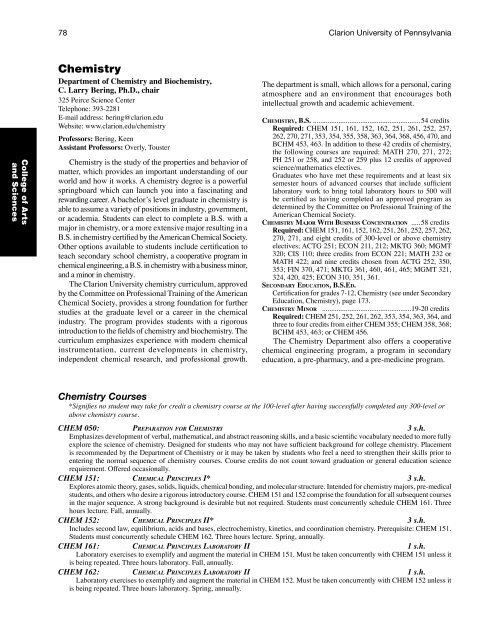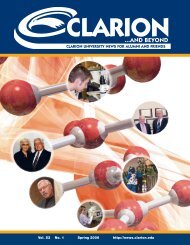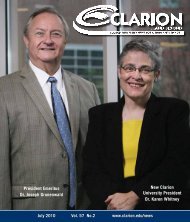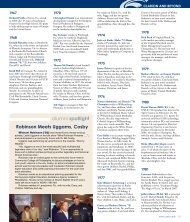pages i-viiiCollege of Artsand Sciences78 <strong>Clarion</strong> <strong>University</strong> of PennsylvaniaChemistryDepartment of Chemistry and Biochemistry,C. Larry Bering, Ph.D., chair325 Peirce Science CenterTelephone: 393-2281E-mail address: bering@clarion.eduWebsite: www.clarion.edu/chemistryProfessors: Bering, KeenAssistant Professors: Overly, TousterChemistry is the study of the properties and behavior ofmatter, which provides an important understanding of ourworld and how it works. A chemistry degree is a powerfulspringboard which can launch you into a fascinating andrewarding career. A bachelor’s level graduate in chemistry isable to assume a variety of positions in industry, government,or academia. Students can elect to complete a B.S. with amajor in chemistry, or a more extensive major resulting in aB.S. in chemistry certified by the American Chemical Society.Other options available to students include certification toteach secondary school chemistry, a cooperative program inchemical engineering, a B.S. in chemistry with a business minor,and a minor in chemistry.The <strong>Clarion</strong> <strong>University</strong> chemistry curriculum, approvedby the Committee on Professional Training of the AmericanChemical Society, provides a strong foundation for furtherstudies at the graduate level or a career in the chemicalindustry. The program provides students with a rigorousintroduction to the fields of chemistry and biochemistry. Thecurriculum emphasizes experience with modern chemicalinstrumentation, current developments in chemistry,independent chemical research, and professional growth.The department is small, which allows for a personal, caringatmosphere and an environment that encourages bothintellectual growth and academic achievement.Chemistry, B.S. ...........................................................54 creditsRequired: CHEM 151, 161, 152, 162, 251, 261, 252, 257,262, 270, 271, 353, 354, 355, 358, 363, 364, 368, 456, 470, andBCHM 453, 463. In addition to these 42 credits of chemistry,the following courses are required: MATH 270, 271, 272;PH 251 or 258, and 252 or 259 plus 12 credits of approvedscience/mathematics electives.Graduates who have met these requirements and at least sixsemester hours of advanced courses that include sufficientlaboratory work to bring total laboratory hours to 500 willbe certified as having completed an approved program asdetermined by the Committee on Professional Training of theAmerican Chemical Society.Chemistry Major With Business Concentration .....58 creditsRequired: CHEM 151, 161, 152, 162, 251, 261, 252, 257, 262,270, 271, and eight credits of 300-level or above chemistryelectives; ACTG 251; ECON 211, 212; MKTG 360; MGMT320; CIS 110; three credits from ECON 221; MATH 232 orMATH 422; and nine credits chosen from ACTG 252, 350,353; FIN 370, 471; MKTG 361, 460, 461, 465; MGMT 321,324, 420, 425; ECON 310, 351, 361.Secondary Education, B.S.Ed.Certification for grades 7-12, Chemistry (see under SecondaryEducation, Chemistry), page 173.Chemistry Minor ..................................................19-20 creditsRequired: CHEM 251, 252, 261, 262, 353, 354, 363, 364, andthree to four credits from either CHEM 355; CHEM 358, 368;BCHM 453, 463; or CHEM 456.The Chemistry Department also offers a cooperativechemical engineering program, a program in secondaryeducation, a pre-pharmacy, and a pre-medicine program.Chemistry Courses*Signifies no student may take for credit a chemistry course at the 100-level after having successfully completed any 300-level orabove chemistry course.CHEM 050: Preparation for Chemistry 3 s.h.Emphasizes development of verbal, mathematical, and abstract reasoning skills, and a basic scientific vocabulary needed to more fullyexplore the science of chemistry. Designed for students who may not have sufficient background for college chemistry. Placementis recommended by the Department of Chemistry or it may be taken by students who feel a need to strengthen their skills prior toentering the normal sequence of chemistry courses. Course credits do not count toward graduation or general education sciencerequirement. Offered occasionally.CHEM 151: Chemical Principles I* 3 s.h.Explores atomic theory, gases, solids, liquids, chemical bonding, and molecular structure. Intended for chemistry majors, pre-medicalstudents, and others who desire a rigorous introductory course. CHEM 151 and 152 comprise the foundation for all subsequent coursesin the major sequence. A strong background is desirable but not required. Students must concurrently schedule CHEM 161. Threehours lecture. Fall, annually.CHEM 152: Chemical Principles II* 3 s.h.Includes second law, equilibrium, acids and bases, electrochemistry, kinetics, and coordination chemistry. Prerequisite: CHEM 151.Students must concurrently schedule CHEM 162. Three hours lecture. Spring, annually.CHEM 161: Chemical Principles Laboratory II 1 s.h.Laboratory exercises to exemplify and augment the material in CHEM 151. Must be taken concurrently with CHEM 151 unless itis being repeated. Three hours laboratory. Fall, annually.CHEM 162: Chemical Principles Laboratory II 1 s.h.Laboratory exercises to exemplify and augment the material in CHEM 152. Must be taken concurrently with CHEM 152 unless itis being repeated. Three hours laboratory. Spring, annually.
<strong>Clarion</strong> <strong>University</strong> of Pennsylvania 79CHEM 153: General Chemistry I* 3 s.h.Initial course in the fundamental concepts of chemistry for students not majoring in chemistry; it can serve as a preparation forCHEM 254 or as a general education elective. Includes atomic theory and structure, stoichiometry, chemical bonding, and the physicalstates of matter. Must be taken concurrently with CHEM 163. Three hours lecture. Fall, annually.CHEM 154: General Chemistry II* 3 s.h.Continuation of CHEM 153. Includes a discussion of solutions, thermodynamics, equilibria, kinetics, acids and bases, and oxidationreduction.Must be taken concurrently with CHEM 164. Prerequisite: CHEM 153. Three hours lecture. Spring, annually.CHEM 163: General Chemistry Laboratory I 1 s.h.Laboratory exercises to exemplify and augment the material in CHEM 153. Must be taken concurrently with CHEM 153 unless itis being repeated. Three hours laboratory. Fall, annually.CHEM 164: General Chemistry Laboratory II 1 s.h.Laboratory exercises to exemplify and augment the material in CHEM 154. Must be taken concurrently with CHEM 154 unless itis being repeated. Prerequisites: CHEM 153, 163. Three hours laboratory. Spring, annually.CHEM 205: Nutrition 3 s.h.Introduces the basic principles of human nutrition. Explores the structure of proteins, fats, carbohydrates, vitamins, and mineralsand their role in metabolism. Analyzes nutritional needs of various age groups, nutrition and disease, and recent research in nutritionalproblems. Prerequisite: One semester of general chemistry or consent of instructor.CHEM 211/GS 411: Science and Society3 s.h.Describes the process of science as an ongoing and continuously developing means of describing the natural world. Examineswhat science is and how it is done. Promotes science literacy. Emphasizes written and oral communication skills as well as the abilityto understand important topics in science, along with the policy and ethical questions raised. Open to students in all academic areas.CHEM 251: Organic Chemistry I 3 s.h.Examines bonding, structure, stereochemistry, nomenclature, and the mechanisms of substitution and electrophilic addition.Emphasizes organic syntheses, reactions, and methods. Students must concurrently schedule CHEM 261. Prerequisites: CHEM 151,152 or 153, 154. Three hours lecture. Fall, annually.CHEM 252: Organic Chemistry II 3 s.h.Continuation of CHEM 251. A discussion of functional groups, their preparation and reactions. Emphasizes synthesis and mechanisms.Students must concurrently schedule CHEM 262. Prerequisite: CHEM 251. Three hours lecture. Spring, annually.CHEM 261: Organic Chemistry Laboratory I 1 s.h.Consists of experiments using important techniques, natural product isolation, and synthesis using modern instrumental methods.Must be taken concurrently with CHEM 251 unless it is being repeated. Three hours laboratory. Fall, annually.CHEM 262: Organic Chemistry Laboratory II 1 s.h.Complex synthesis and organic qualitative analysis using modern instrumentation. Emphasizes the important spectroscopic methodsof infrared and nuclear magnetic resonance spectroscopy and mass spectrometry. Must be taken with CHEM 252 unless it is beingrepeated. Prerequisite: CHEM 261. Three hours laboratory. Spring, annually.CHEM 254: Introductory Organic Chemistry 3 s.h.Surveys the field of elementary organic chemistry, emphasizing nomenclature, simple reactions and mechanisms, and the structure oforganic compounds, together with their relation to biology. Does not count toward the requirements for a major in chemistry and must betaken concurrently with CHEM 264 unless it is being repeated. Prerequisite: CHEM 152 or 154. Three hours laboratory. Fall, annually.CHEM 264: Introductory Organic Chemistry Laboratory 1 s.h.Introduces important techniques, synthesis, and functional group analyses of organic compounds. Must be taken concurrently withCHEM 254 unless it is being repeated. Three hours laboratory. Fall, annually.CHEM 257: Organic Spectroscopy 2 s.h.Applies modern spectroscopic techniques to the determination of the structures of organic compounds. Discusses the techniquesof infrared, nuclear magnetic resonance, and mass spectroscopy, emphasizing their application toward the elucidation of structuresof organic compounds. Presents necessary theoretical background and applications. Required of all chemistry majors and must betaken concurrently with CHEM 252. Prerequisites for other students: CHEM 254, 264 and consent of instructor.CHEM 270: Chemical Information 1 s.h.Covers sources, organization, and effective use of chemical information. Includes working safely with chemicals, regulatory agenciesand their role in ensuring safety and environmental quality, and critical evaluation of scientific literature. Discusses aspects of bothprinted and computer-based information sources. Problem assignments provide illustration and practice in effective searching of thechemical literature. Co-requisites: CHEM 251, 261. Fall, annually.CHEM 271: Introductory Inorganic Chemistry 2 s.h.Introduces coordination and descriptive inorganic chemistry. Laboratory focuses on the properties and reaction chemistry of theelements and inorganic compounds. Prerequisite: CHEM 152/162. Spring, annually.CHEM 351: Introduction to Analytical Chemistry 3 s.h.Explores the theory and applied techniques and instrumentation of analytical chemistry for majors in the allied health and otherbiological professions. Includes separation procedures and spectrophotometric, volumetric, and electroanalytical methods. Geared towardthe analytical chemistry needs of the allied health and biological professions. Does not count toward the requirements for a major inchemistry. Students must concurrently schedule CHEM 361. Prerequisite: CHEM 152 or 154. Three hours lecture. Spring, annually.CHEM 353: Analytical Chemistry I 3 s.h.Serves students both in chemistry and in related fields. Includes spectrophotometric and volumetric methods of chemical analysis.Students must concurrently schedule CHEM 363. Prerequisite: CHEM 152 or 154. Three hours lecture. Fall, annually.pages i-viiCollege of Artsand Sciences
















